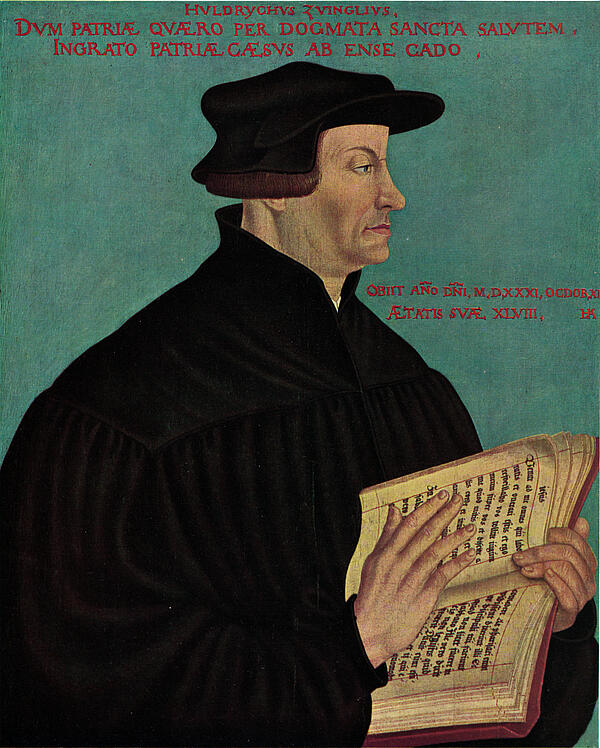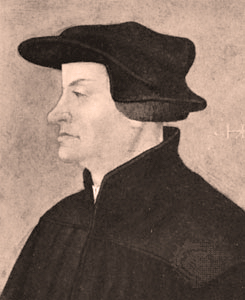Ulrich Zwingli
Ulrich Zwingli was an influential reformer and leader of the Reformation in Switzerland. He shared many of Martin Luther’s beliefs, but disputed some aspects of his theology - including whether God was present in the Eucharist.
Born the son of a free peasant on 1 January 1484, Ulrich Zwingli attended universities at Basel and Vienna and served as a parish priest in Glarus, Switzerland.
Like Luther, he was influenced by Humanism. In 1518 he moved to Zurich as a Common Preacher at the Great Minster. It was here that Zwingli crafted the ‘Zurich Reformation’ - reforms that would make the city a stronghold of Protestantism.

Zurich adopted the ‘67 Articles’ as its official doctrine and launched a series of dramatic reforms. These including making Bible readings more frequent; destroying relics and images; allowing clerical marriage; dissolving monasteries and encouraging monks and nuns to join the community.
Zurich officially broke with Rome in 1525. The Mass changed dramatically, becoming a simple ceremony whereby the bread and wine simpl represented Christ. The church had more influence in controlling the moral behaviour of the city’s inhabitants and strict observance to Protestantism was encouraged.
Zwingli faced a similar problem to John Calvin and Martin Luther in that the city’s population were divided in opinion: some were concerned that he’d moved too quickly, while others argued that he had not done enough. This group included the Anabaptists, who were dealt with when Zwingli supported the move to exile and kill the Anabaptists if they refused to leave the city.
Luther and Zwingli met for the Marburg Colloquy in 1529. The objective of the meeting was to resolve the differences between each reformer’s beliefs in a bid to unite the Protestant faiths. However, the meeting failed in this objective. Neither man could reach agree on what Christ said at the Last Supper. Luther argued that ‘this is my body’ meant that Christ is literally present in the Eucharist, whereas Zwingli argued that he is only symbolically present.
Zurich was a Protestant stronghold, but the surrounding areas failed to adopt the religion, with many remaining wary of the backlash from the Catholic Church.
They also worried that Zurich would try to assert its authority across the rest of the region and enforce Protestantism. Zurich’s surrounding areas formed the Christian Union in 1529 and joined with the catholic Austrian monarchy. Zwingli declared a religious war against them and launched two campaigns in 1529 and 1531. Zwingli was brutally killed at the Battle of Keppel in October 1531. His work was continued by his son-in-law, Heinrich Bullinger.
See also: The Beliefs of Ulrich Zwingli
MLA Citation/Reference
"Ulrich Zwingli". HistoryLearning.com. 2026. Web.

